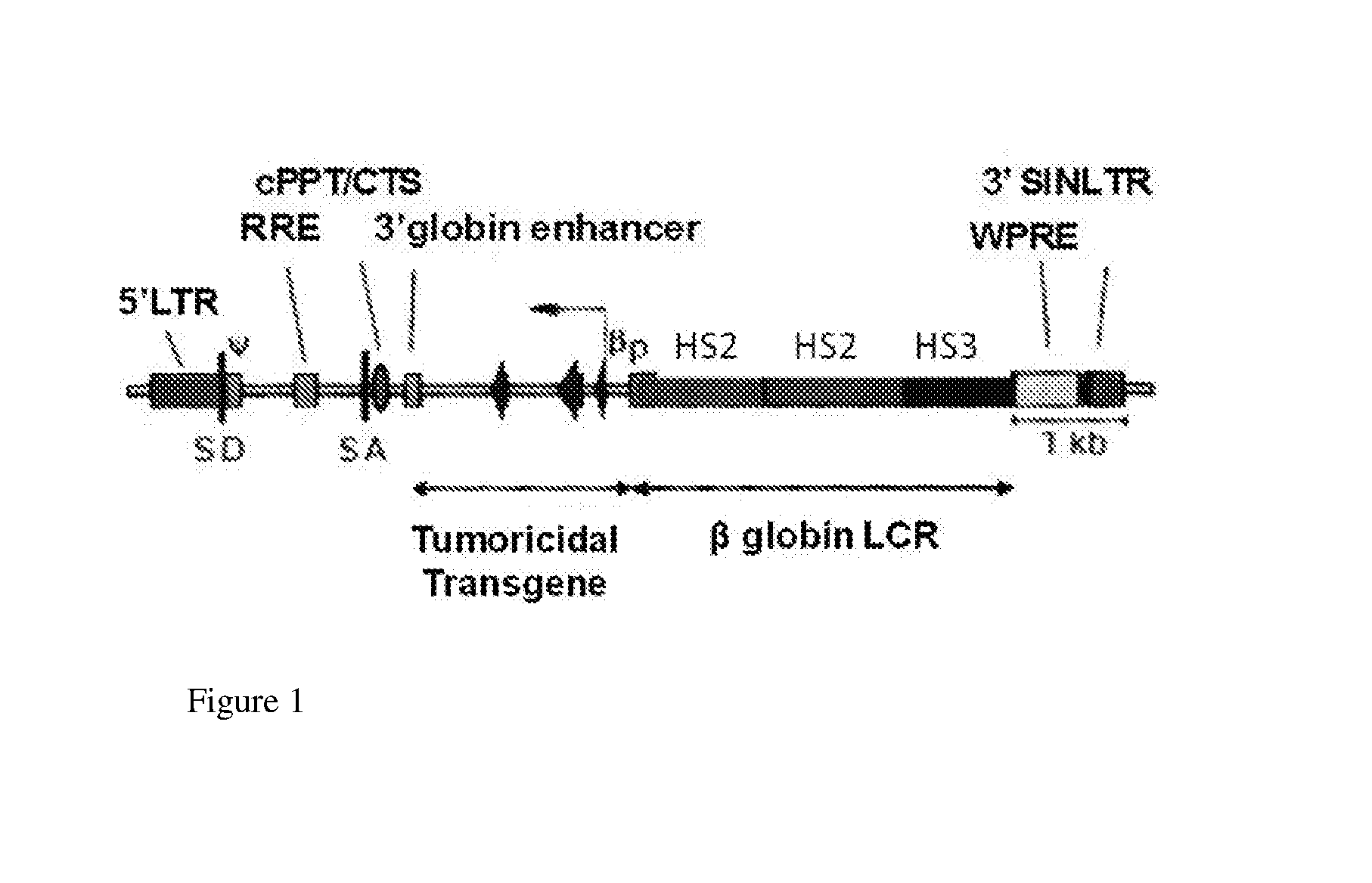Sickled Erythrocytes and Progenitors Target Cytotoxics to Tumors
a technology of sickled erythrocytes and progenitors, applied in the field of genetics and medicine, can solve problems such as provoking tumors
- Summary
- Abstract
- Description
- Claims
- Application Information
AI Technical Summary
Benefits of technology
Problems solved by technology
Method used
Image
Examples
example 7
[0257]Methods for SS cell encapsulation, optionally incorporating ferrous molecules are described below (G. L. Dale, et al, Biochem. Med. 18,220 (1977); DeLoach J R & Sprandel U (eds.), “Red Blood Cells as Carriers for Drugs.” Karger-Verlag, Basel, Switzerland, (1985): Zimmermann U et al, Biochim. Biophys. Acta 436: 460 (1976); DeLoach & Ihler G. Biochim Biophys Acta 496: 136 (1977)) which are herein incorporated by reference.
Materials
[0258]Buffer I (isosmotic): 150 mM NaCl, 5 mM K2HP04 / KH2P04, pH 7.4.
Buffer II (isosmotic): like buffer 1, in addition 10 mM glucose, 5 mM adenosine, 1 mM MgCl2.
Buffer III (hyposmotic): 5 mM K2HPO4 / KH2PO4, pH 7.4.
Preparation of Erythrocyte Ghosts
[0259]Erythrocyte ghosts are prepared by a hypotonic dialysis procedure with best results obtained after standardization of the following parameters. Washed red blood cells are placed into dialysis tubing. Then a solution of buffer I and (optionally) the ferrofluids to be entrapped (25% ferrofluids in buffer I) ...
example 1
[0342]For human studies, SS erythrocytes (SSRBCs) or SS nucleated erythrocyte precursors (SSEPCs) are obtained from patients with homozygous S or sickle thalassemia hemoglobin, hemizygous sickle S and A hemoglobin, sickle hemoglobin-C disease, sickle beta plus thalassemia, sickle hemoglobin-D disease, sickle hemoglobin-E disease, homozygous C or C—thalassemia, hemoglobin-C beta plus thalassemia, homozygous E or E—thalassemia. The erythrocytes are a ABO- and Rh-matched for compatibility with recipients. Tumors of any type are susceptible to therapy with these agents. The cells are administered intravenously or intraarterially in a blood vessel perfusing a specific tumor site or organ, e.g. carotid artery, portal vein, femoral artery etc. over the same amount of time required for the infusion of a conventional blood transfusion. The quantity of cells to be administered in any one treatment ranges from one tenth to one half of a full unit of blood. The treatments are generally given ev...
example 2
[0346]For human studies, SS erythrocytes (SSRBCs) or nucleated SS erythrocyte precursors (SSEPCs) obtained from patients with homozygous S or sickle thalassemia hemoglobin, hemizygous sickle S and A hemoglobin, sickle hemoglobin-C disease, sickle beta plus thalassemia, The erythrocytes are ABO- and Rh-matched for compatibility with recipients are used. These erythrocytes express beta-2 adrenergic receptors operatively linked to granzyme and perforin. Neuroblastomas and pheochromocytomas are susceptible to therapy with these agents. The cells are administered intravenously or intraarterially in a blood vessel perfusing a specific tumor site or organ, e.g. carotid artery, portal vein, femoral artery etc. over the same amount of time required for the infusion of a conventional blood transfusion. The quantity of cells to be administered in any one treatment ranges from one tenth to one half of a full unit of blood. The treatments are generally given every 2-7 days for a total of 1-12 tr...
PUM
| Property | Measurement | Unit |
|---|---|---|
| humidity | aaaaa | aaaaa |
| body weight | aaaaa | aaaaa |
| pH | aaaaa | aaaaa |
Abstract
Description
Claims
Application Information
 Login to View More
Login to View More - R&D
- Intellectual Property
- Life Sciences
- Materials
- Tech Scout
- Unparalleled Data Quality
- Higher Quality Content
- 60% Fewer Hallucinations
Browse by: Latest US Patents, China's latest patents, Technical Efficacy Thesaurus, Application Domain, Technology Topic, Popular Technical Reports.
© 2025 PatSnap. All rights reserved.Legal|Privacy policy|Modern Slavery Act Transparency Statement|Sitemap|About US| Contact US: help@patsnap.com



